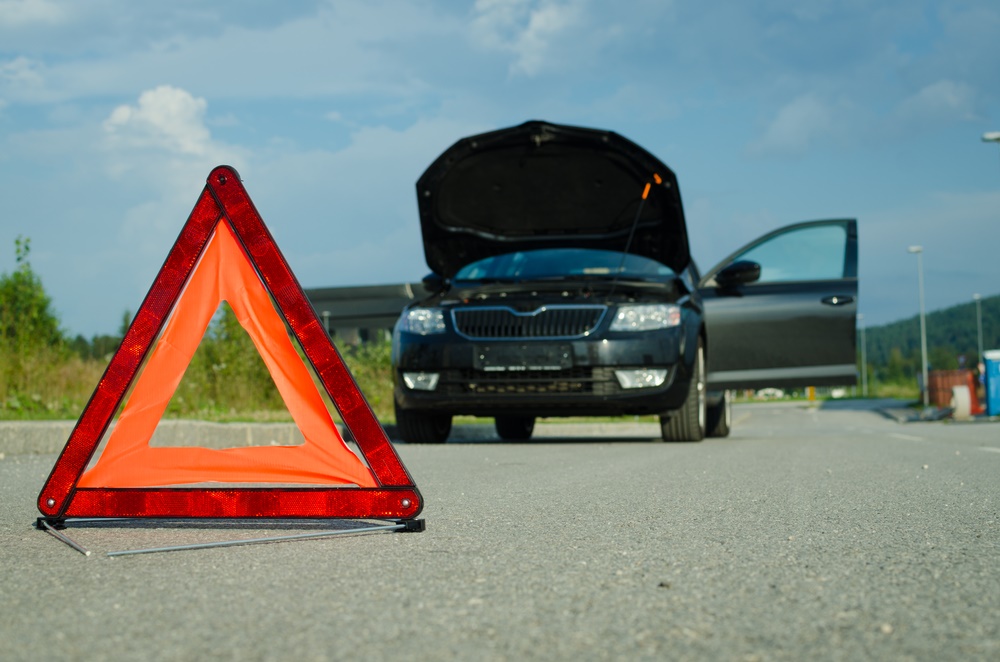The Top 20 Essentials For a Car Emergency Kit
1. Flares or hazard triangles: High visibility flares or triangles are always good to have on hand. They help other vehicles see you in case of an emergency or accident. These are something you should never leave home without.
2. Carjack and spare tire: Sounds like a no-brainer, right? Flat tires are one of the most common roadside emergencies, yet you would be surprised how often people don't have a carjack or spare tire to fix one. Also, studies show that up to 60% of drivers don't know how to change a tire, so learning before it's needed is recommended.
3. Can of tire inflator and sealant: If you don't know how to fix a tire or worst-case scenario, there's a problem with your spare, a can of tire inflator and sealant will do the trick in an instant.
4. Tire pressure gauge: Over or underinflated tires are one of the leading causes of a blowout. Having a tire pressure gauge and checking your pressure often helps prevent an emergency before it happens.
5. Jumper cables: It can happen. You walk into a store and forget your lights are on. By the time you walk out again, your car battery is dead. If you have jumper cables, you can find a good Samaritan to give you a quick jump-start and be on your way again.
6. Emergency car battery charger: Imagine a day of hiking, camping, fishing, or anything else in an isolated area. You accidentally leave a dome light on. When you come back, your car battery is dead. While you have jumper cables, there are no cars or people nearby to give you a hand. While a little pricier than other things on this list, a car battery charger can save you hours of frustration.
7. A 5-gallon gas can: Of course vehicles come with gas gages, warning lights, and in some cases, even a count down. So, how do you ever run out of gas? Well, gas gages can break, and sometimes their owners don't know until it's too late. Also, in extreme circumstances, you can find yourself off course of your destination and nowhere near a gas station.
8. Fire extinguisher: While no one likes to think of car accidents, they happen. With those accidents, sometimes fires also arise. Having a fire extinguisher on hand and readily available for use can save lives quickly.
9. A quart of motor oil: While you should check your oil continuously, having a spare quart of motor oil is always a good idea.
10. A gallon of coolant: Coolant can keep your car from overheating in the summer and from freezing up in the winter. Always make sure you have some on hand.
11. Toolkit: A small toolkit full of everyday tools is essential for every car. Often, you can purchase a mechanic's toolkit that will include a tire gauge and electrical tape.
12. Multi-purpose tool: A small Swiss-Army Knife or multi-purpose tool, kept on your keyring, can work in a pinch for a lot of small jobs when needed.
13. Car escape tool: In an accident, safety items like a seatbelt and airbags can become obstacles if you need to get out quickly. That's why having a car escape tool within reach of the driver's seat is imperative. You can use it to cut through a seatbelt or even break a windshield.
14. Flashlight with extra batteries and extra cell battery: Having a breakdown doesn’t always happen during daylight hours. Make sure you have a flashlight with spare batteries. It'll shine some light on what you're doing or illuminate your path if you need to move on foot. Also, always keep a fully-charged cell battery in your car for emergencies.
15. Map: Despite the use of GPS, a map is always good if you're going on a trip or to a rural area. If something happens to your phone or you can't get cell service, having a physical map can get you safely where you need to be.
16. First-aid kit: Whether you're out on a hiking trip, playing at the park with the kids, or camping in the wilderness, having a fully stocked first-aid kit in your car makes sense. Ensure there's a whistle on hand to attract attention in case of an accident or emergency. Also, keep a candle in a deep can along with matches in case you ever need to start a fire.
17. Water: Keep plastic water bottles so they don't freeze, and change them out every 6 months.
18. Nonperishable food: Keep foods such as granola and energy bars, and exchange them every 6 months.
19. Blankets: If your car breaks down in the middle of the winter, you won't be able to rely on the heater working. Keeping blankets in your car ensures you won't freeze if you become stranded for any length of time.
20. Gloves, socks, stocking cap, extra set of clothes: Have a pair of work gloves to do any repair work in. Then, keep warm gloves, socks, a stocking cap, and an extra set of clothes in case of emergency for added warmth and protection.

Google Reviews
"Provided exceptional fast service. The people were extremely professional and nice. Would highly recommend this company again!"
- Mark
"Everyone from customer service and the tow service were professional and made sure I understood the process from beginning to end. I will definitely recommend your services to others. Thanks"
- Lady
"Great follow-up and fantastic service. Gave me top dollar for my junk car. Highly recommend!"
- Timothy
Sell My Junk Car Massachusetts
- Massachusetts
- 617-741-5679
Cash For Cars Massachusetts
Massachusetts Nearby
2025 © Sell My Junk Car Massachusetts All Rights Reserved. Privacy Policy
